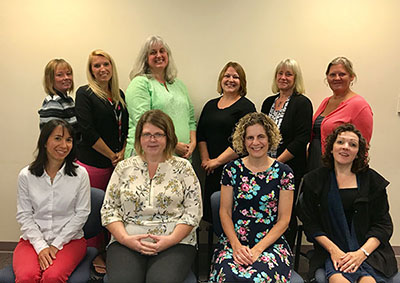Mentor Team
The mentors are experienced teachers who serve as a professional development resource for New Hampshire adult educators.
The mentors can:
- provide personal consultation by telephone or email
- make suggestions about materials, resources, and classroom management
- give onsite workshops at adult education centers
- invite you to visit their classes
- come to visit you and your class
 Mentor Team
Mentor Team
Tiffany Brand, M.Ed.
NH Adult Education Technology Mentor
Technology Integrator & Computer Literacy Instructor
Dover Adult Learning Center
cell – (603) 978-8581
Crystal Sawyer
HiSET Mentor
Director, Carroll County Adult Education
Kim Hanson
ABE/HiSET/Accuplacer Math Mentor
Dover Adult Learning Center
Rachelle Cox
Adult Diploma Mentor
Director, Littleton Adult Diploma, Above the Notch Community School
Lauren Osowski
Program Director Mentor
Director, Nashua Adult Learning Center
History
In 2000, Debbie Tasker, former Educational Consultant to the Bureau of Adult Education, brought up the idea of a Mentor Team at a Program Director’s meeting. The Directors were asked to nominate exemplary and experienced teachers. The idea was to have these practitioners work with newly hired adult education teachers to shorten their learning curve.
Originally, the mission was to work with new teachers. Other activities were added such as bringing in new ideas in the field. One of the first projects was to work on the New Staff workshop and mentors eventually came to be the “go to people” for conferences and other professional development activities.
After several years, it was determined that the Mentor Team should have representation from each type of program. Currently, the team has representation from Adult Basic Education, English as a Second Language, Adult Learner Services, Technology, College/Post-Secondary Transitions, Adult Diploma Program and the Disabilities Coordinator. There was also an attempt to have the Mentor Team geographically represented across the state.
Most of the work of the Mentor Team has generated from the field. As practitioners expressed needs, the Mentor team addressed those needs through workshops, classroom observations, one-on-one evaluations and mentoring services.
In 2013, the Mentor Team created a Job Embedded Professional Development Guidebook. Some other projects include the NH Adult Ed website, the New Staff Primer and Mentor Tip Sheets. More recent projects include the addition of "traveling" ABE/ESL sharing sessions, a well-attended presentation on preparing for the 2016 HiSET changes and training on “how to be a presenter” with a guidebook.
Mentor Job Description
- Attend mentor team meetings in Concord
- Participate in planning and presenting statewide staff development opportunities in response to the needs of the field
- Be available to adult educators, especially new staff, for consultation by email, telephone, or visits
- Serve as professional development advisors to communicate needs of the field and to help design services to meet the needs
- Serve as role models for other adult educators
- Serve as professional development resources for local directors by responding to requests for teacher guidance and offering onsite staff development.
- Provide information about resources to adult educators, including information on the NH adult education website, and help develop new resources and curriculum materials to meet identified needs
- As needed, conduct training sessions and facilitate sharing groups in areas of specialty
Find Mentor Tips in our Educator Resource Library
Mentor Services
One on One Mentoring
- Consult with individual employees of programs sponsored by the Bureau of Adult Education by answering questions, suggesting strategies, recommending materials and resources.
- Requests can be made by an individual teacher who is looking for assistance in improving teaching, tackling new content area or looking for a “breath of fresh air”. Mentors can observe classrooms and provide teachers with feedback and suggestions.
- These services might include meeting with new teachers to welcome them to adult education.
- A BAE program director might request a mentor to work with a paid practitioner to provide some new ideas, a different perspective or access to additional resources. The mentor should not be expected to evaluate employee performance.
- See fee scale in the Program Directors Resource Handbook
Mentor Workshops for Bureau of Adult Education Programs
- Mentors can be requested to provide up to two on-site workshops addressing specific areas of need for a local program. For example, teaching strategies for adults with learning disabilities; pronunciation in ESOL; differentiated instruction; developing classroom website. See mentor areas of expertise for a complete list.
- Program directors requesting workshops are responsible for providing an appropriate meeting area, refreshments, photocopying services and any technology set-up.
- Mentor workshops are designed for programs sponsored by the Bureau of Adult Education.
Program Consultation
A program director might request a mentor to work with a group of teachers to assist with curriculum development, building community, teaching strategies, presenting new information, supporting program goals and professional growth.
Community Workshops
Social services agencies, non-profit or other community organizations may request a workshop from the mentors on topics such as services in adult education, assistance with a specific learning need in the community or a topic from the mentor list.
- This service is free for the community agency.
- Workshop must have a minimum of 8 participants.
- The community agency is responsible for providing an appropriate meeting space, refreshments, photocopying and attendee compensation if applicable.
- For more than 2 workshops, the community agency will need to develop a contract with the Bureau of Adult Education to cover the cost of providing continued services.



